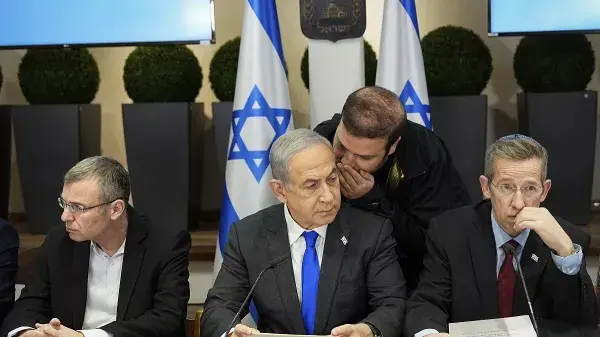Opinion| Netanyahu escalates conflict in Southern Lebanon amidst waning US support, seeking political salvation – Dailynewsegypt


Israeli Prime Minister Benjamin Netanyahu is determined to do whatever it takes to save himself from the upcoming trials he faces, whether they are related to political, military, or intelligence failures, or financial and administrative corruption. He is willing to sacrifice everything, including provoking conflicts in southern Lebanon and even involving Iran if necessary.
Despite the objections of the American administration, Netanyahu is actively seeking to escalate tensions in southern Lebanon beyond the agreed-upon limits set after the 2006 operation between Hezbollah and Tel Aviv. Recent events, such as the assassination of Palestinian leader Saleh Al-Arouri in Hezbollah’s stronghold and the killing of Hezbollah commander Wissam al-Tawil, indicate Netanyahu’s deliberate attempts to provoke a response and drag Hezbollah into a prolonged war in southern Lebanon. He hopes to regain the support he has lost from the United States and the West due to his actions in the Gaza Strip.
Although there was an unofficial agreement between Tehran and Washington to avoid direct military confrontation during the October 7 crisis, Netanyahu’s failure to achieve significant gains in Gaza has increased pressure on him internally from cabinet members and Israeli prisoner families. External support has also waned, with those who initially supported him, including the United States and Europe, starting to retreat. This has come as a shock to Netanyahu, leading him to consider using his usual tactic of opening multiple fronts in an attempt to embarrass everyone involved, especially President Joe Biden, who is reviewing his political positions in the lead-up to the presidential election.
Netanyahu’s insistence on igniting conflicts in southern Lebanon indicates a political and military decision to bring about a drastic change in the security situation along Israel’s northern border. The government is burdened with more than 100,000 settlers who have left their villages and settlements to move into Israel proper. Israel aims to implement International Resolution 1701, issued by the Security Council in 2006, which calls for the establishment of a weapons-free buffer zone between the border and the Litani River in southern Lebanon. This would give Hezbollah legal and international legitimacy to deploy in southern Lebanon, bypassing the role of the Lebanese National Army. For Netanyahu, this move would allow the safe return of settlers while putting pressure on Hamas through Nasrallah to respond to truce initiatives and release Israeli hostages in the Gaza Strip.
Israel is increasingly warning that if the international community does not diplomatically push Hezbollah, who, like Hamas, has sworn to destroy Israel, away from the border, Israel will take action itself. Netanyahu echoed Defence Minister Yoav Galant’s statement that there is a “short window of time” to reach diplomatic understandings with Hezbollah, with the desired outcome being the creation of a new reality in the northern arena that ensures the safe return of Israeli citizens.
Hezbollah and its Secretary-General Hassan Nasrallah find themselves in a difficult position, as Netanyahu’s repeated assassinations leave them with no choice but to respond militarily. The first assassination targeted an individual affiliated with Hamas, allowing the party to avoid expanding the conflict. However, the second assassination targeted one of Hezbollah’s leaders in the south, removing any justification for restraint. A military confrontation now seems inevitable.
Nasrallah has threatened that residents of northern Israel will be the first to suffer if a large-scale war breaks out on the northern front. He has also vowed to avenge the killing of Hamas Vice President Saleh al-Arouri in Beirut.
The crisis is on the brink of escalation on multiple fronts, including those already open and those yet to be opened. The future of the Gaza Strip and its governance, particularly its security aspect, remains uncertain. There are concerns that this conflict, which has been ongoing for four months, could expand regionally into Iraq, Syria, and the Red Sea. The visits and talks by American and Western officials appear to be mere gestures without meaningful results, as military operations continue to escalate with no clear victor in sight.
Dr. Hatem Sadek is a Professor at Helwan University






